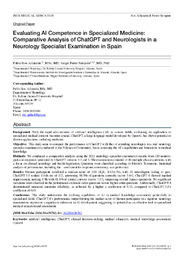Please use this identifier to cite or link to this item:
https://hdl.handle.net/11000/37213Full metadata record
| DC Field | Value | Language |
|---|---|---|
| dc.contributor.author | Ros Arlanzón, Pablo | - |
| dc.contributor.author | Pérez Sempere, Ángel | - |
| dc.contributor.other | Departamentos de la UMH::Medicina Clínica | es_ES |
| dc.date.accessioned | 2025-09-05T07:49:34Z | - |
| dc.date.available | 2025-09-05T07:49:34Z | - |
| dc.date.created | 2024-11 | - |
| dc.identifier.citation | JMIR Med Educ . 2024 Nov 14:10:e56762 | es_ES |
| dc.identifier.issn | 2369-3762 | - |
| dc.identifier.uri | https://hdl.handle.net/11000/37213 | - |
| dc.description.abstract | Background: With the rapid advancement of artificial intelligence (AI) in various fields, evaluating its application in specialized medical contexts becomes crucial. ChatGPT, a large language model developed by OpenAI, has shown potential in diverse applications, including medicine. Methods: We conducted a comparative analysis using the 2022 neurology specialist examination results from 120 neurologists and responses generated by ChatGPT versions 3.5 and 4. The examination consisted of 80 multiple-choice questions, with a focus on clinical neurology and health legislation. Questions were classified according to Bloom's Taxonomy. Statistical analysis of performance, including the κ coefficient for response consistency, was performed. Results: Human participants exhibited a median score of 5.91 (IQR: 4.93-6.76), with 32 neurologists failing to pass. ChatGPT-3.5 ranked 116th out of 122, answering 54.5% of questions correctly (score 3.94). ChatGPT-4 showed marked improvement, ranking 17th with 81.8% of correct answers (score 7.57), surpassing several human specialists. No significant variations were observed in the performance on lower-order questions versus higher-order questions. Additionally, ChatGPT-4 demonstrated increased interrater reliability, as reflected by a higher κ coefficient of 0.73, compared to ChatGPT-3.5's coefficient of 0.69. Conclusions: This study underscores the evolving capabilities of AI in medical knowledge assessment, particularly in specialized fields. ChatGPT-4's performance, outperforming the median score of human participants in a rigorous neurology examination, represents a significant milestone in AI development, suggesting its potential as an effective tool in specialized medical education and assessment. | es_ES |
| dc.format | application/pdf | es_ES |
| dc.format.extent | 8 | es_ES |
| dc.language.iso | eng | es_ES |
| dc.publisher | JMIR Publications | es_ES |
| dc.rights | info:eu-repo/semantics/openAccess | es_ES |
| dc.rights | Attribution-NonCommercial-NoDerivatives 4.0 Internacional | * |
| dc.rights.uri | http://creativecommons.org/licenses/by-nc-nd/4.0/ | * |
| dc.subject | artificial intelligence | es_ES |
| dc.subject | ChatGPT | es_ES |
| dc.subject | clinical decision-making | es_ES |
| dc.subject | OpenAI | es_ES |
| dc.title | Evaluating AI Competence in Specialized Medicine: Comparative Analysis of ChatGPT and Neurologists in a Neurology Specialist Examination in Spain | es_ES |
| dc.type | info:eu-repo/semantics/article | es_ES |
| dc.relation.publisherversion | 10.2196/56762 | es_ES |

View/Open:
Evaluating AI Competence in Specialized Medicine Comparative Analysis of ChatGPT and Neurologists in a Neurology Specialist Examination in Spain.pdf
312,87 kB
Adobe PDF
Share:
.png)
